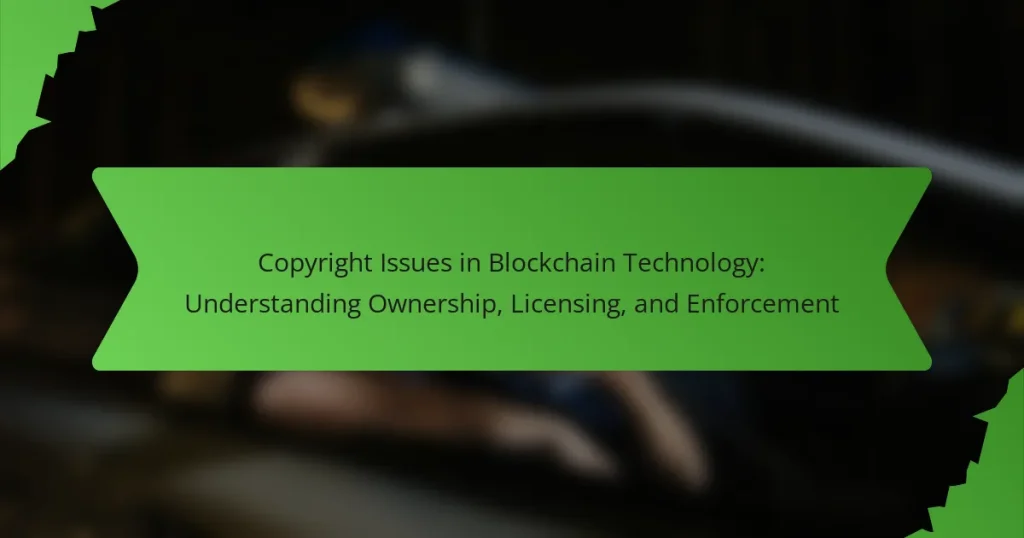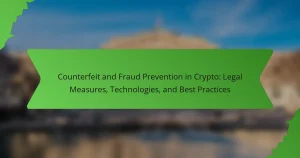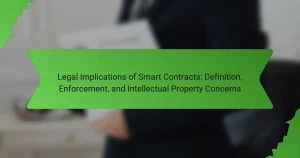Copyright issues in blockchain technology focus on the ownership and licensing of digital content, complicated by the technology’s immutable nature. The lack of clear attribution for content shared on blockchain leads to disputes over ownership, while smart contracts offer automated licensing solutions that may not fully resolve copyright concerns. The decentralized structure of blockchain can hinder the identification of infringers, prompting courts to explore how existing copyright laws apply within this context. Effective copyright enforcement in blockchain environments involves mechanisms like smart contracts, transparent ownership records, and digital rights management solutions, all aimed at protecting creators’ rights and ensuring compliance with copyright laws. Best practices include establishing clear ownership, utilizing smart contracts, and maintaining thorough documentation of rights to minimize infringement risks.
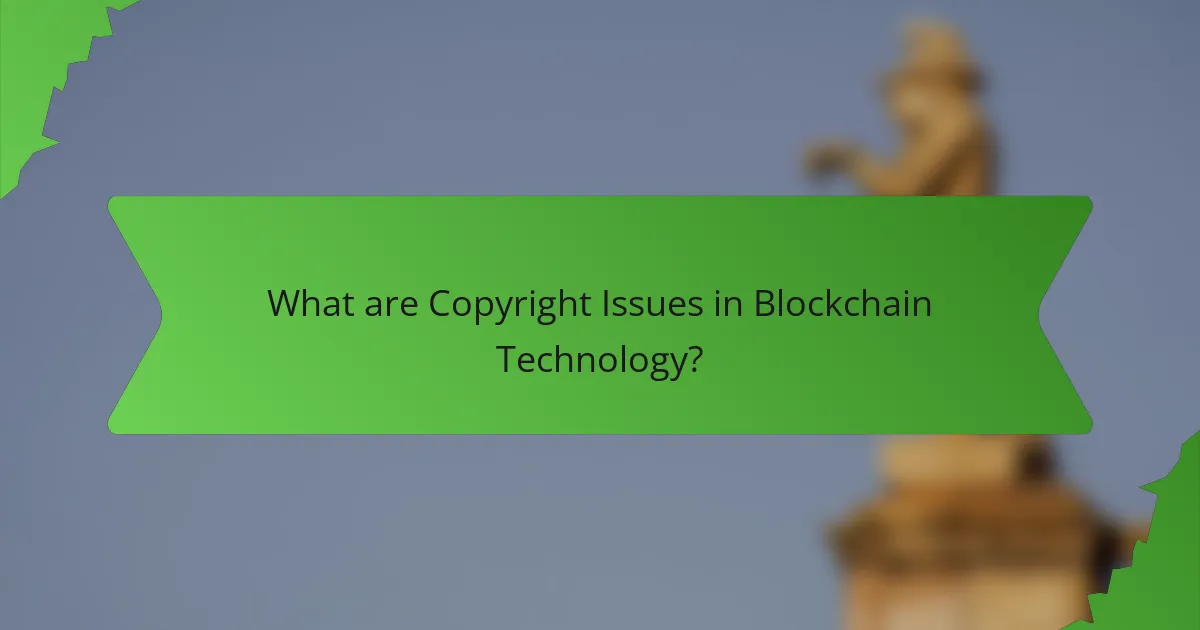
What are Copyright Issues in Blockchain Technology?
Copyright issues in blockchain technology primarily revolve around the ownership and licensing of digital content. Blockchain’s immutable nature complicates the enforcement of copyright laws. Content created and shared on blockchain may not have clear attribution, leading to disputes over ownership. Smart contracts can automate licensing but may not address all copyright concerns. Additionally, the decentralized aspect can make it challenging to identify infringers. Courts are still determining how existing copyright laws apply to blockchain. These complexities highlight the need for updated legal frameworks to address digital content in blockchain environments.
How do copyright laws interact with blockchain technology?
Copyright laws protect the rights of creators over their original works. Blockchain technology can facilitate the registration and tracking of these works. By using blockchain, creators can establish proof of ownership through immutable records. This transparency can simplify licensing agreements and royalty distributions. However, copyright laws still apply regardless of the technology used. The legal framework surrounding copyright does not inherently change with blockchain. Issues may arise regarding the enforcement of copyright in decentralized networks. Jurisdictional challenges can complicate legal actions against copyright infringement on blockchain platforms.
What are the key legal frameworks governing copyright in the digital age?
The key legal frameworks governing copyright in the digital age include the Copyright Act of 1976, the Digital Millennium Copyright Act (DMCA), and the Berne Convention. The Copyright Act of 1976 establishes the foundation for copyright law in the United States. It outlines the rights of authors and creators over their original works. The DMCA, enacted in 1998, addresses copyright issues related to the internet and digital content. It includes provisions for safe harbors for online service providers. The Berne Convention, an international agreement, sets minimum standards for copyright protection among member countries. It ensures that works are protected without the need for formal registration. These frameworks collectively shape how copyright is enforced and managed in the digital landscape.
How does blockchain technology challenge traditional copyright norms?
Blockchain technology challenges traditional copyright norms by decentralizing ownership and control of digital content. It enables creators to register their works on a public ledger, ensuring transparency and traceability. This reduces reliance on intermediaries like publishers or record labels. Smart contracts automate licensing agreements, allowing for real-time royalty payments. Traditional copyright systems often involve lengthy legal processes to enforce rights. Blockchain’s immutable records can streamline these processes, providing clear proof of ownership. This shift may undermine established copyright frameworks that depend on centralized authority. The emergence of decentralized platforms further complicates enforcement of traditional copyright laws.
What is the significance of ownership in blockchain copyright issues?
Ownership is crucial in blockchain copyright issues as it defines the rights of creators over their digital assets. In blockchain, ownership is verified through decentralized ledgers, ensuring transparency and immutability. This technology allows creators to maintain control over their work, preventing unauthorized use or reproduction. Clear ownership records can help resolve disputes regarding copyright infringement. Studies show that blockchain can enhance the protection of intellectual property rights. For example, the World Intellectual Property Organization highlights blockchain’s potential in tracking ownership and licensing. Therefore, ownership in blockchain serves as a foundational element in safeguarding copyright in the digital landscape.
Who owns the content created and stored on a blockchain?
The owner of the content created and stored on a blockchain is typically the creator of that content. Ownership can also be transferred through agreements or smart contracts. Each piece of content is linked to a specific address on the blockchain. This address represents the owner’s rights to the content. Legal frameworks surrounding copyright apply to blockchain content. Various jurisdictions may interpret ownership differently. For example, copyright law in the U.S. grants rights to the creator. Therefore, the original creator retains ownership unless explicitly transferred.
How is ownership determined in decentralized networks?
Ownership in decentralized networks is determined by the possession of private keys associated with digital assets. Each asset is linked to a unique cryptographic address. Users control their assets through these private keys. The blockchain records all transactions, providing a transparent history of ownership. This record ensures that ownership can be verified by anyone on the network. The consensus mechanism of the network validates transactions, reinforcing ownership claims. Each transaction is immutable, making it difficult to dispute ownership. Therefore, possession of the private key serves as the definitive proof of ownership in decentralized networks.
What role does licensing play in blockchain technology?
Licensing plays a crucial role in blockchain technology by defining the terms under which software and digital assets can be used. It establishes legal frameworks that govern the distribution and usage rights of blockchain applications. Licensing ensures compliance with intellectual property laws, protecting creators’ rights while enabling innovation. For example, open-source licenses allow developers to share and modify code while retaining certain rights. Additionally, licensing agreements can facilitate collaborations between companies, ensuring that all parties understand their rights and obligations. This clarity fosters trust within the blockchain ecosystem. Overall, licensing is essential for balancing innovation and legal protection in blockchain technology.
What types of licenses are applicable to blockchain-based content?
The types of licenses applicable to blockchain-based content include open-source licenses, proprietary licenses, and creative commons licenses. Open-source licenses allow users to modify and distribute the content freely. Examples include the MIT License and the GNU General Public License. Proprietary licenses restrict usage and distribution, granting rights only to the licensee. Creative commons licenses offer a flexible range of protections and freedoms for authors, allowing them to specify how their work can be used. These licenses facilitate legal clarity in ownership and usage rights within the blockchain ecosystem.
How can creators enforce their licensing agreements on blockchain?
Creators can enforce their licensing agreements on blockchain through smart contracts. Smart contracts automate the execution of agreements when predefined conditions are met. They ensure that usage rights are respected by automatically granting access or restricting it based on the terms set by the creator. Blockchain’s transparency allows for easy verification of ownership and licensing terms. This reduces the likelihood of disputes over copyright infringement. Additionally, the immutable nature of blockchain records prevents unauthorized alterations to licensing agreements. As a result, creators can maintain control over their intellectual property effectively.
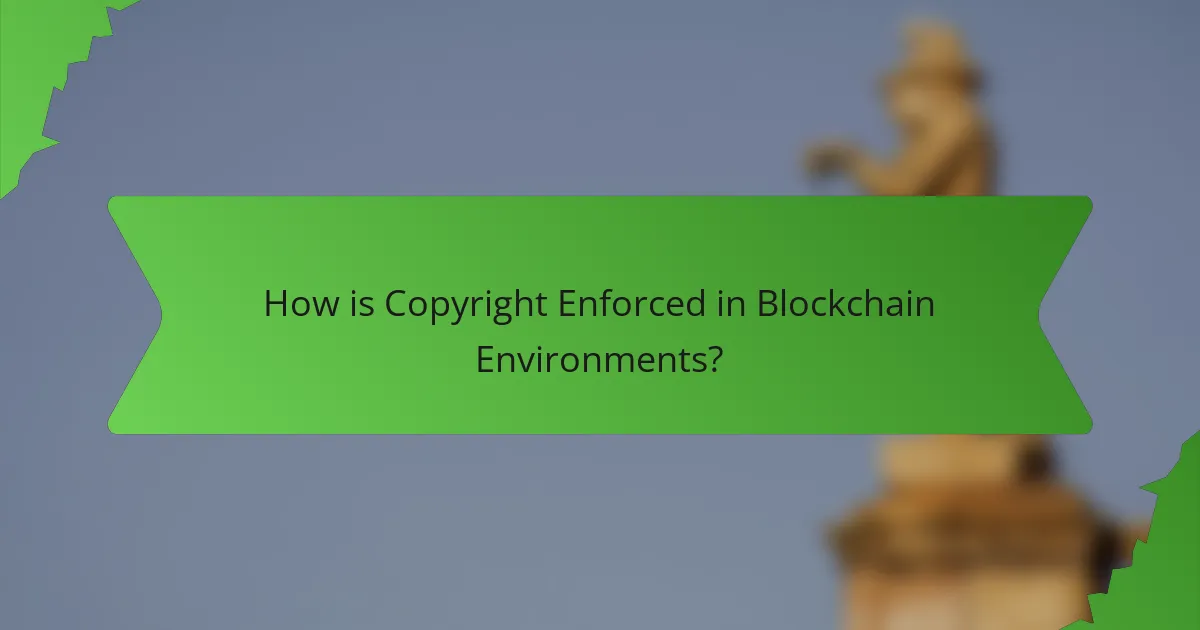
How is Copyright Enforced in Blockchain Environments?
Copyright is enforced in blockchain environments through various mechanisms that leverage the technology’s inherent properties. Smart contracts can automate licensing agreements and ensure compliance with copyright terms. These self-executing contracts are coded to trigger actions when specific conditions are met, facilitating enforcement.
Blockchain’s immutable ledger records ownership and transaction history transparently. This transparency aids in proving ownership and tracking unauthorized use of copyrighted material. Additionally, decentralized applications (dApps) can provide platforms for creators to manage their rights and distribute their works securely.
Some projects utilize digital rights management (DRM) solutions built on blockchain. These solutions help in monitoring usage and ensuring that creators receive compensation. Furthermore, community governance models can empower users to report and address copyright infringements collectively.
Research indicates that blockchain can enhance copyright enforcement efficiency. A study by the World Intellectual Property Organization (WIPO) highlights how blockchain’s features can address challenges in traditional copyright systems.
What are the challenges of enforcing copyright in blockchain?
Enforcing copyright in blockchain presents several challenges. The decentralized nature of blockchain complicates the identification of copyright holders. Traditional copyright laws rely on centralized authorities for enforcement, which blockchain inherently lacks. Additionally, the immutability of blockchain records makes it difficult to remove infringing content. This permanence can hinder timely responses to copyright violations. Furthermore, the pseudonymous nature of blockchain transactions obscures the true identity of users. This anonymity complicates legal actions against infringers. Lastly, the global reach of blockchain creates jurisdictional issues. Different countries have varying copyright laws, making enforcement inconsistent. These factors collectively hinder effective copyright enforcement in blockchain environments.
How do smart contracts facilitate copyright enforcement?
Smart contracts facilitate copyright enforcement by automating the execution of copyright agreements. They enable creators to define the terms of use and licensing directly in the code. This ensures that any use of the copyrighted material adheres to the specified conditions. When someone wants to use the work, the smart contract automatically verifies compliance. If the terms are met, the contract executes the necessary actions, such as payment transfer. This process reduces the need for intermediaries, streamlining enforcement. Additionally, smart contracts provide a transparent and immutable record of transactions. This transparency helps in proving ownership and usage rights, which is crucial in copyright disputes.
What are the limitations of current enforcement mechanisms?
Current enforcement mechanisms for copyright in blockchain technology face significant limitations. These mechanisms often struggle with jurisdictional issues due to the decentralized nature of blockchain. Enforcement can be complicated by the anonymity of users, making it difficult to identify infringers. Additionally, existing laws may not adequately address the unique challenges posed by blockchain technology. Many enforcement actions require substantial resources, which can hinder effectiveness. The rapid evolution of technology often outpaces legal frameworks, leading to gaps in protection. Furthermore, there is a lack of standardization in how copyright is applied across different blockchain platforms. These factors collectively undermine the efficacy of enforcement efforts in this area.
What are the implications of copyright infringement in blockchain?
Copyright infringement in blockchain can lead to significant legal and financial consequences. It challenges the traditional notions of ownership and licensing. Unauthorized use of copyrighted material can result in lawsuits. Blockchain’s immutable nature complicates the removal of infringing content. Enforcement of copyright in decentralized systems is often unclear. Many blockchain platforms lack established protocols for handling infringement. This uncertainty can deter creators from sharing their work. Additionally, it may lead to a loss of revenue for content creators.
What are the potential legal consequences for infringers?
Infringers of copyright laws may face significant legal consequences. These can include civil lawsuits for damages, which may amount to statutory damages ranging from $750 to $30,000 per work infringed. In cases of willful infringement, damages can increase up to $150,000 per work. Additionally, infringers may be subject to injunctions that prohibit further use of the copyrighted material. Criminal penalties may also apply, including fines and imprisonment for willful infringement, especially if it involves commercial gain. The Copyright Act of 1976 outlines these consequences, providing a legal framework for enforcement against infringers.
How can blockchain technology help prevent copyright violations?
Blockchain technology can help prevent copyright violations by providing a secure and transparent way to record ownership and usage rights. Each piece of digital content can be linked to a unique blockchain entry. This entry contains metadata about the creator, ownership, and licensing terms. The immutable nature of blockchain ensures that once this information is recorded, it cannot be altered or deleted.
This creates a verifiable chain of ownership that can be easily accessed and audited. Smart contracts on the blockchain can automate licensing agreements and enforce terms of use. For example, they can automatically execute payments to creators when their work is used.
According to a study by the World Intellectual Property Organization, blockchain can enhance copyright protection by making it easier to track and manage intellectual property rights. This technology reduces the risk of unauthorized use and ensures that creators receive proper attribution and compensation.
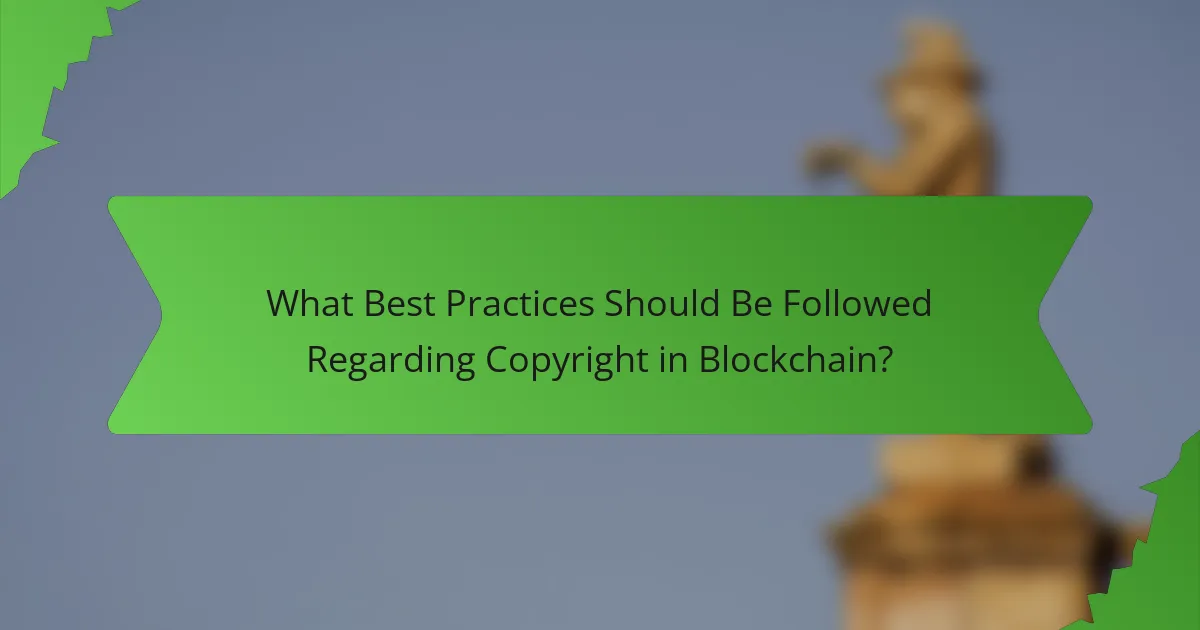
What Best Practices Should Be Followed Regarding Copyright in Blockchain?
Best practices for copyright in blockchain include ensuring clear ownership, utilizing smart contracts, and documenting rights. Clear ownership establishes who holds the copyright for digital assets. Smart contracts automate licensing agreements and enforce terms transparently. Documentation of rights helps in legal claims and disputes. Regular audits of blockchain entries ensure compliance with copyright laws. Adhering to these practices minimizes infringement risks and protects creators’ rights.
How can creators protect their intellectual property in blockchain?
Creators can protect their intellectual property in blockchain by using smart contracts. Smart contracts automatically enforce agreements and ensure that creators receive royalties. They can define ownership rights and usage terms within the contract. This technology provides a transparent record of ownership. Blockchain’s decentralized nature makes it harder for unauthorized copying. Additionally, creators can mint non-fungible tokens (NFTs) to represent their work. NFTs serve as proof of ownership and authenticity. This method has gained popularity among artists and musicians. Overall, blockchain technology enhances protection and enforcement of intellectual property rights.
What strategies can be employed to ensure copyright compliance?
To ensure copyright compliance, organizations should implement several strategies. First, they must conduct regular audits of their content to identify copyrighted materials. This includes reviewing all assets used in projects. Second, they should establish clear policies regarding the use of copyrighted content. These policies should outline permissions and attributions required for third-party materials. Third, organizations should invest in training employees about copyright laws and compliance. Educated staff can better recognize potential infringements. Additionally, using copyright management tools can help track and manage licenses effectively. These tools provide reminders for renewals and usage limits. Lastly, seeking legal advice when in doubt can prevent unintentional violations. Legal experts can offer guidance tailored to specific situations.
How can education about copyright issues improve blockchain practices?
Education about copyright issues can improve blockchain practices by enhancing understanding of intellectual property rights. This understanding helps developers create compliant smart contracts. Educated stakeholders are better equipped to navigate licensing agreements. They can avoid potential legal disputes over content ownership. Knowledge of copyright can also promote ethical use of digital assets. Increased awareness leads to responsible innovation in blockchain applications. Furthermore, education fosters collaboration between creators and technologists. This collaboration can drive the development of fair compensation models. Improved practices ultimately strengthen the blockchain ecosystem and protect creators’ rights.
What resources are available for understanding copyright in blockchain?
Resources available for understanding copyright in blockchain include academic articles, legal frameworks, and online courses. Academic articles often explore the intersection of copyright law and blockchain technology. Legal frameworks provide guidelines on intellectual property rights in digital contexts. Online courses from platforms like Coursera and edX cover copyright law fundamentals and blockchain implications. Additionally, organizations like the World Intellectual Property Organization (WIPO) offer publications and resources on copyright issues related to emerging technologies. These resources help clarify ownership, licensing, and enforcement challenges within blockchain systems.
Where can one find legal assistance regarding blockchain copyright issues?
One can find legal assistance regarding blockchain copyright issues through specialized law firms that focus on intellectual property and technology law. Many of these firms have dedicated teams for blockchain-related matters. Organizations such as the International Association for Privacy Professionals (IAPP) also provide resources and referrals. Legal clinics at universities often offer pro bono services for copyright issues. Additionally, online platforms like LegalZoom and Rocket Lawyer provide access to legal advice on blockchain copyright matters. These resources ensure informed guidance in navigating complex copyright laws in blockchain technology.
What are the best online platforms for learning about copyright and blockchain?
The best online platforms for learning about copyright and blockchain include Coursera, Udemy, and edX. Coursera offers courses from universities like Stanford and Yale on copyright law and blockchain technology. Udemy features practical courses focusing on blockchain applications in copyright. edX provides professional certifications in intellectual property and blockchain from institutions like Harvard. These platforms are recognized for their comprehensive content and expert instructors. They also offer flexibility in learning, allowing users to study at their own pace.
Copyright issues in blockchain technology focus on the complexities of ownership, licensing, and enforcement of digital content. The article explores how blockchain’s immutable nature challenges traditional copyright norms, complicating the attribution and enforcement of rights. Key legal frameworks and the role of smart contracts in automating licensing agreements are examined, alongside the implications of copyright infringement within decentralized networks. Additionally, best practices for protecting intellectual property and resources for legal assistance in navigating copyright challenges in blockchain are highlighted.
